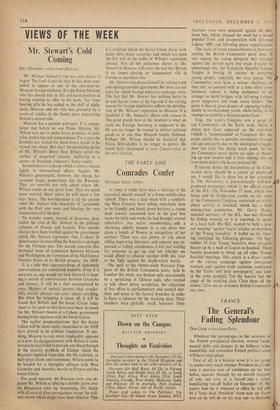Mr. Stewart's Cold • Coming
Div MURARK A writes from Moscow:
Mr. Michael Stewart's trip was over before it began. The fault is not his that he has been com- pelled to appear as one of the also-went-to- Moscow foreign ministers. It is his Prime Minister who has placed him in this awkward position of having nothing to offer to his hosts. Far from bearing gifts he has added to the chill of diplo- matic Moscow and his visit was preceded by a series of articles in the Soviet press deprecating Britain's current role.
Moscow has a genuine grievance. It is remem- bered that before he was Prime Minister Mr. Wilson was apt to make brave promises of initi- ative, leadership and independence. For a year the Kremlin has waited for those brave words to be turned into deeds. But alas! the promising spring of Mr. Wilson's Brave New Britain wears the clothes of perpetual autumn, sheltering in a corner of President Johnson's Texas ranch.
Inconsistency is a charge which is always treated lightly in international affairs. Against Mr. Wilson's government, however, the charge has assumed major proportions for the Russians. They are worried not only about where Mr. Wilson stands on any given issue. They are much more worried about where he will stand a few days hence. The bewilderment is all the greater when Mr. Stewart talks hopefully of 'agreement with the East' one week and blasting the very foundations of it the next.
No wonder stones, instead of blossoms, have hailed the visit of Mr. Stewart in the political columns of Pravda and Izvestia. Two specific charges have been levelled against the government which Mr. Stewart represents. One is about its Spinelessness in overselling the American apologia for the Vietnam war. The second concerns that perennial bone of contention between Moscow and Washington, the formation of the Multilateral Nuclear Force or its British progeny, the ANF.
It is a pity that tape-recordings of diplomatic conversations are considered impolite. Even if it were not so, one would not look forward to hear- ing a record of conversations between Gromyko and Stewart. It will be a duet accompanied by rows. Matters of mutual interest (that wonder- fully evasive phrase) can cover almost anything. But when the wrapping is taken off, it will be found that Britain and the Soviet Union today stand as far apart as they have ever been. So much for Mr. Wilson's boasts of a Labour government having better relations with the Soviet Union.
The earlier prognostications that the Soviet Union will be more easily reconciled to the ANF have proved to be without foundation. If any- thing, Moscow is even more implacably opposed to it now. Its disappointment with Wilson is acute because he has failed to provide any breakthrough in the security problem of Europe which the Russians expected from him. On the contrary, to their great alarm and resentment, Britain seems to be headed for a triangular alliance with West Germany and America, hostile to France and the Soviet Union.
For good measure, the Russians have also de- picted Mr. Wilson as playing a double game over the Rhodesian crisis by threatening Mr. Smith with all sorts of dire consequences except the mili- tary moves which might have been effective. This is a criticism which the Soviet Union shares with many Afro-Asian countries and which has been the last nail in the coffin of Wilson's reputation abroad. Not all the politeness shown to Mr. Stewart in Moscow will cover the fact that Britain is no longer playing an independent role in Europe or anywhere else.
Mr. Stewart can please himself by talking trade and signing consular agreements. But these are not tasks for which foreign ministers exchange visits. The fact that Mr. Stewart has nothing better to do and that he comes at the fag-end of the visiting season for foreign dignitaries reflects the devalua- tion of Mr. Wilson's reputation in Moscow. It is doubtful if Mr. Stewart's efforts will restore it. The great puzzle here at the moment is what on earth the Foreign Secretary is supposed to do. He can no longer be trusted to deliver political goods as at one time Moscow fondly believed. Perhaps Mr. Wilson should be thankful that Nikita Khrushchev is no longer in power. He would have threatened to vote Conservative at the next election.






































 Previous page
Previous page